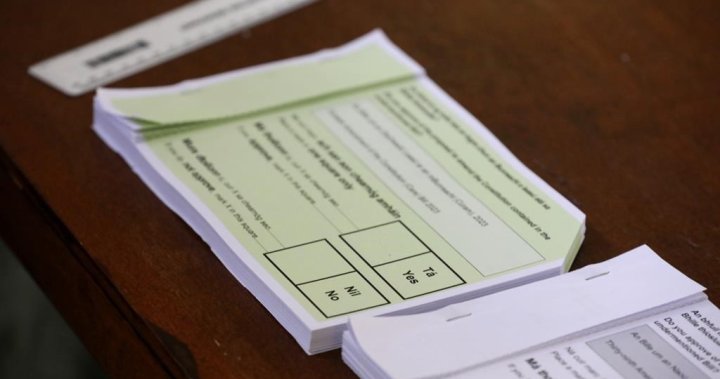According to Ireland’s Constitution, a woman’s place is in the home.
Irish voters will decide Friday — International Women’s Day — whether to change the 87-year-old document to remove passages the government says are outdated and sexist. The twin referendums are on deleting a reference to women’s domestic duties and broadening the definition of the family.
While many women and men support the amendments, others say the proposed changes are confusing and could have unintended consequences.
What are the referendums about?
The first vote deals with a part of the constitution that pledges to protect the family as the primary unit of society. Voters are being asked to remove a reference to marriage as the basis “on which the family is founded” and replace it with a clause that says families can be founded “on marriage or on other durable relationships.” If passed, it will be the 39th amendment to Ireland’s Constitution.
The second change — a proposed 40th amendment — would remove a reference to women’s role in the home as a key support to the state, and delete a statement that “mothers shall not be obliged by economic necessity to engage in labor to the neglect of their duties in the home.” It would add a clause saying the state will strive to support “the provision of care by members of a family to one another.”
Why are they happening now?
Ireland’s Constitution dates from 1937, though the country did not not formally become known as the Republic of Ireland until 1948. It has changed enormously since then, transforming from a conservative, overwhelmingly Roman Catholic country in which divorce and abortion were illegal, to an increasingly diverse and socially liberal society. The proportion of residents who are Catholic fell from 94.9% in 1961 to 69% in 2022, according to the Central Statistics Office.
The social transformation has been reflected in a series of constitutional changes. Irish voters legalized divorce in a 1995 referendum, backed same-sex marriage in a 2015 vote and repealed a ban on abortions in 2018.

Prime Minister Leo Varadkar announced a year ago, on International Women’s Day 2023, that the government would hold a referendum to enshrine gender equality and remove discriminatory language from the constitution. The new votes are about removing “very old-fashioned language” and recognizing the realities of modern family life, said Varadkar, Ireland’s first ethnic minority leader, who is in a same-sex relationship but not married.
Do the changes have widespread support?
Opinion polls suggested support for the “yes” side on both votes, but many voters remained undecided as polling day neared.
The debate has been less charged than the arguments over abortion and gay marriage. Ireland’s main political parties all support the changes, including centrist government coalition partners Fianna Fail and Fine Gael and the biggest opposition party, Sinn Fein.
Breaking news from Canada and around the world
sent to your email, as it happens.
Tracy Carroll from County Meath in central Ireland, who cares full-time for her two children, said women had long been told “our place in society is in the home and looking after our children and our husbands.”
“We’ve moved from that, but the constitution hasn’t moved from that, and a women’s place is anywhere she wants it to be,” she told Sky News.

Opponents argued that the wording of the changes was poorly thought out — an argument that appeared to gain traction in the final days of the campaign.
One political party calling for “no” votes is Aontú, a traditionalist group that split from Sinn Fein over the larger party’s backing for legal abortion. Aontú leader Peadar Tóibín said the government’s wording is so vague it will lead to legal wrangles and most people “do not know what the meaning of a durable relationship is.”
The Free Legal Advice Centers, a legal charity, has expressed concern the change to the section on care contains “harmful stereotypes such as the concept that the provision of care … is the private responsibility of unpaid family members without any guarantee of state support.”
Some disability rights campaigners argue the emphasis on care treats disabled people as a burden, rather than as individuals with rights that should be guaranteed by the state.
In Dublin, nurse Una Ui Dhuinn said she voted no to both changes because “I thought it was too rushed.”
“I felt we didn’t get enough time to think about it and read up on it. So I felt, to be on the safe side, ‘no, no’ — no change,” she said.

Caoimhe Doyle, a doctoral student, said she voted yes to changing the definition of family but no to the care amendment because “I don’t think it was explained very well.”
“There’s a worry there that they’re removing the burden on the state to take care of families,” she said.
Varadkar, who insists the state is not abdicating its care responsibilities, said rejecting the changes “would be a setback for the country.”
“If there’s a ‘no’ vote, on Saturday morning hundreds of thousands of children in Ireland will wake up to hear that Irish society has decided that their family isn’t a constitutional family, isn’t an equal family, just because their parents aren’t married,” Varadkar said this week. “If there’s a ‘yes’ vote, we’ll be saying as a society that all families are equal.”
John O’Doiln, who voted yes to both changes, agreed that rejecting them would be a backwards step, “because so much will be read into a ‘no’ vote.”
When will results be known?
Polling stations are open from 7 a.m. to 10 p.m. local time Friday. Counting of the ballots from each of Ireland’s 39 constituencies starts at 9 a.m. Saturday, with results likely to be known Saturday afternoon or evening.
Irish citizens who are 18 or older – some 3.3 million people — are eligible to vote.
—Lawless reported from London.



